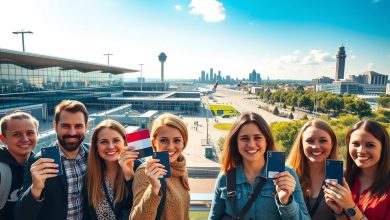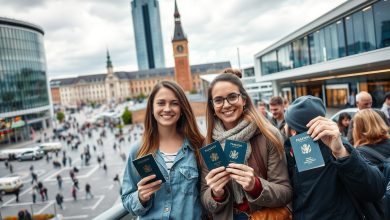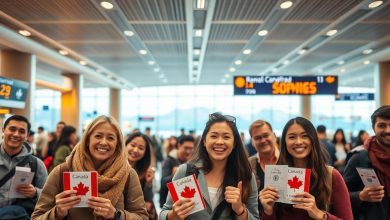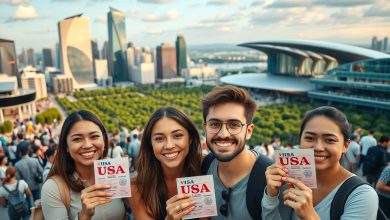USA Visa Sponsorship and Marriage Visa: A Complete Step-by-Step Guide for Couples and Individuals
Anúncios
Navigating the immigration process can be complex, especially for couples seeking permanent resident status.
This guide simplifies the steps for Nigerian applicants exploring marriage-based options like CR1, IR1, or K3 visas. Understanding eligibility early helps avoid delays.
Anúncios
Sponsorship plays a crucial role in this journey. A U.S. citizen or lawful permanent resident must file a petition to begin the process. The USCIS and National Visa Center review applications before approval.
Conditional and permanent residency differ in duration and requirements. Knowing these distinctions ensures smoother transitions. Citizenship immigration services provide support, but preparation remains key.
This guide breaks down each phase, from application to interview. Clear explanations help couples make informed decisions about their future together.
Anúncios
Understanding USA Visa Sponsorship and Marriage Visa
Understanding the nuances of spouse-based immigration requires clarity on key visa classifications. Couples must navigate legal frameworks that define marital validity and residency eligibility. This section explains core concepts to streamline the application process.
What Is a Spouse Visa?
A spouse visa allows a foreign national to enter or remain in the U.S. based on a legally recognized marriage. Under immigration law, the union must meet specific criteria:
- Monogamous (only the first spouse in polygamous marriages qualifies)
- Valid in the country where it was performed
- Common-law marriages recognized if valid in the jurisdiction
The spouse may apply for either conditional or permanent residency, depending on the marriage duration. Immediate Relative visas prioritize spouses of U.S. citizens, while Family Second Preference applies to lawful permanent residents.
Differences Between CR1 and IR1 Visas
CR1 and IR1 visas both lead to a green card, but their requirements differ:
CR1 visas are for marriages under two years, granting conditional residency. IR1 visas apply to unions lasting over two years, offering permanent resident status immediately.
Documentation varies slightly, with CR1 applicants needing to later file Form I-751 to remove conditions. K3 visas, once popular for faster processing, now often take equal time to CR1/IR1, reducing their appeal.
Eligibility Requirements for Marriage-Based Visas
Proper documentation separates successful applications from denied petitions. Couples must prove their union meets legal standards while sponsors fulfill financial and residency obligations. Missing one requirement can delay or derail the process.
Who Qualifies as a Spouse Under U.S. Immigration Law?
A petition alien relative must provide evidence of a valid marriage. Cohabitation or ceremonial unions without legal registration are insufficient. Recognized marriages include:
- Civil or religious ceremonies documented by a marriage certificate
- Same-sex marriages if legally performed
- Common-law marriages valid in the jurisdiction
Fraudulent claims trigger severe penalties, including permanent bans. Applicants may need wedding photos, joint accounts, or affidavits to prove authenticity.
Age and Residency Requirements for U.S. Sponsors
Sponsors filing Form I-130 must be at least 18 years old. They must also maintain a U.S. domicile or demonstrate intent to reestablish one. Exceptions apply for active military personnel, who need only meet 100% of the federal poverty guidelines.
Those living abroad must show ties to the U.S., such as property ownership or voter registration. The citizenship immigration process prioritizes sponsors who can financially support their partners.
Step 1: Filing the Petition (Form I-130)
The first legal step for couples involves submitting Form I-130 to establish eligibility. This petition confirms the relationship between the sponsor and foreign national, triggering the review process. Accuracy here prevents delays or rejections.
How to File Form I-130
Sponsors must provide proof of citizenship or lawful permanent residency alongside the $535 fee. Required documents include a marriage certificate and evidence of a bona fide union, such as joint financial records. Immigration services recommend online submissions for faster tracking.
Nigerian applicants should anticipate 6–12 months for processing. Concurrent filing with Form I-485 is permitted if the spouse resides in the U.S., streamlining adjustment of status.
Where to Submit the Petition
Form I-130 is mailed to USCIS lockbox facilities or filed digitally via their portal. The correct location depends on the sponsor’s address and whether they’re a citizen or green card holder.
Upgrading a petition from LPR to citizen status requires submitting a copy of the naturalization certificate.
Common denial reasons include incomplete forms, insufficient evidence, or ineligibility. Double-checking entries with USCIS guidelines minimizes errors.
Financial Support: The Affidavit of Support (Form I-864)
Financial stability is a cornerstone of successful immigration applications for couples. The U.S. government requires sponsors to prove they can financially support their partner, ensuring the applicant won’t rely on public assistance. This commitment is formalized through the affidavit support process.
Minimum Income Requirements
Sponsors must meet income thresholds based on federal poverty guidelines. For 2025, a household of two needs at least $26,437 annually in most states. Income calculations include salaries, pensions, or stable assets.
Military personnel follow different rules—they need only meet 100% of the poverty level. Tax returns for the past three years are typically required to verify income consistency.
Using Assets to Meet Financial Thresholds
If income falls short, assets can bridge the gap. Liquid assets like savings accounts must total three times the deficit. For example, a $5,000 shortfall requires $15,000 in accessible funds.
Joint sponsors are permitted if the primary sponsor’s resources are insufficient. However, they assume equal legal responsibility for the applicant’s financial support.
Defaulting on sponsorship obligations can lead to legal action or repayment demands from the government.
Upgrading a Petition from LPR to U.S. Citizen
When sponsors transition from lawful permanent residency to citizenship, their petitions may qualify for faster processing. This upgrade shifts cases from Family Second Preference (F2) to Immediate Relative (IR) categories, eliminating annual visa caps.
Required Documentation for Upgrading
Sponsors must submit proof of naturalization to the National Visa Center (NVC). Acceptable documents include:
- Passport biographical page
- Naturalization certificate copy
- Updated Form I-864 (if financials change)
The NVC automatically adjusts the petition to IR status. Notify them promptly to avoid delays. Permanent residence applications benefit from this conversion, as IR visas have no backlog.
Upgrades retain the original priority date, securing the applicant’s place in line.
Processing Implications
Errors like submitting expired documents or incomplete forms can reset review timelines. Double-check all materials before mailing. Resident status upgrades typically add 4–8 weeks to processing.
National Visa Center (NVC) Processing
After USCIS approval, cases move to the National Visa Center for further review. This stage ensures all paperwork aligns with consular standards before scheduling interviews. Applicants must complete financial, medical, and legal requirements.
Paying Fees and Submitting Documentation
The NVC requires a $325 processing fee per applicant. Nigerian applicants can pay online via bank transfer or credit card. Scanned copies of civil documents like birth certificates must meet resolution guidelines.
Translations are mandatory for non-English documents. Certified translators must include a statement of accuracy. Photographs should be 2×2 inches with a white background, taken within the last six months.
Completing Form DS-260
Form DS-260 collects biographical and security details. Applicants must list all addresses, employment history, and family members. Inaccuracies may delay processing.
Save the DS-260 confirmation page for the interview. The NVC assigns case numbers electronically upon fee clearance.
Once submitted, the NVC reviews files for completeness. Missing items trigger a checklist notice. Respond promptly to avoid setbacks.
Required Documentation for the Visa Application
Gathering the right paperwork is critical for a smooth immigration journey. Missing even one item can delay approval. Applicants must provide verified records that meet strict legal standards.
Passport and Photograph Requirements
A valid passport is mandatory. It must have at least six months of validity beyond the intended stay. Photographs should follow these guidelines:
- 2×2 inches with a white background
- Taken within the last six months
- Neutral facial expression, no glasses or headwear (unless religious)
Civil Documents and Translations
Authenticated civil records prove identity and marital history. These include:
- Birth and marriage certificates (original or certified copies)
- Divorce or death certificates for previous marriages
- Military service records, if applicable
Non-English documents require certified translations. The translator must include a statement confirming accuracy.
Police certificates from every country lived in for over six months are also required. Medical exam results remain valid for six months. Keep copies of all submissions—USCIS does not return originals.
Medical Examination and Vaccination Requirements
Medical clearance is a mandatory step for applicants seeking entry into the U.S. based on family ties. Approved physicians conduct tests to screen for communicable diseases and verify vaccination records. Results remain valid for six months, so timing is critical.
Authorized Panel Physicians
Only approved clinics in Lagos and Abuja can perform these exams. The U.S. Embassy provides a list of designated facilities. Tests typically include:
- TB screening with chest X-rays or sputum tests
- Bloodwork for syphilis and HIV
- Review of immunization history
Costs vary by state, with Lagos clinics often charging higher fees. Applicants must schedule appointments early to avoid delays.
List of Required Vaccinations
Vaccination requirements include COVID-19, measles, and hepatitis B. Exemptions apply for medical or religious reasons but require documentation. Panel physicians seal reports after completion—tampering voids results.
Missing a required vaccine may delay processing until the dose is administered.
Follow-up exams are needed if conditions like latent TB are detected. Bring original vaccination records to the appointment.
Scheduling the Visa Interview
The interview stage marks a critical milestone in the immigration journey. After document submission, applicants typically wait 3–6 weeks for an appointment. Interviews average 30 minutes and determine final approval.
What to Expect During the Interview
Consular officers verify relationship authenticity through targeted questions. Nigerian couples should prepare for cultural considerations, such as explaining traditional ceremonies. Key focuses include:
- Consistency in answers about shared experiences
- Evidence of ongoing communication (photos, messages)
- Financial ties, like joint accounts or remittances
Dress professionally—business attire reflects seriousness. Avoid casual wear or flashy accessories. Interpreters are permitted if requested in advance.
Common Interview Questions
The applicant and sponsor may be asked separately about:
“How did you meet?” or “Describe your last reunion.”
Post-interview, administrative process may add 1–2 weeks for final checks. Approved cases receive passports with stamped visas within days.
Rights and Protections for Visa Applicants
Applicants have specific legal protections during the immigration process. These safeguards ensure fairness and safety, especially for vulnerable individuals. Understanding them helps prevent exploitation or delays.
Mandatory Protections Under U.S. Law
A domestic violence awareness briefing is required for all applicants. The status of the relationship doesn’t affect eligibility for these rights. Key provisions include:
- Confidentiality for abuse survivors reporting incidents
- Access to legal aid, regardless of income
- Cultural sensitivity training for counselors
The Violence Against Women Act (VAWA) allows self-petitioning for abused spouses, even without sponsor cooperation.
Reporting Mechanisms and Resources
Abuse victims can contact the National Domestic Violence Hotline or local shelters. Child custody protections are enforced during pending cases. Documentation isn’t required to seek help—verbal claims trigger investigations.
Legal resources include pro bono attorneys and nonprofit organizations. Always verify service legitimacy through official channels like USCIS.
Conditional Residence: What You Need to Know
Couples with conditional residency must take additional steps to secure permanent resident status. This phase ensures the marriage is genuine before granting long-term rights. The process involves filing Form I-751 within a strict 90-day window before expiration.
Removing Conditions on Permanent Residence
Form I-751 requires a $680 fee (2023 rate) and proof of a bona fide marriage. Acceptable evidence includes:
- Joint leases or mortgage statements
- Birth certificates of children together
- Affidavits from friends confirming the relationship
Divorced applicants may file under a waiver but must prove the marriage was initially legitimate. Interviews are rare but possible—prepare to answer detailed questions about shared finances or daily routines.
Missing the 90-day filing window risks deportation. Set calendar reminders as the deadline approaches.
If USCIS issues a Request for Evidence (RFE), respond within 87 days. Delays could reset the years toward naturalization eligibility. Approved petitions convert status to permanent, with green cards valid for 10 years.
How Long Does the Process Take?
Timelines for spouse-based immigration vary based on multiple factors. Current averages range from 15 to 17 months for CR1/IR1 petitions, but delays are common.
The process depends on USCIS service center workloads. Backlogs fluctuate, with some centers taking 3–6 months longer than others. Nigerian applicants often face additional scrutiny.
Factors Affecting Processing Times
Several elements influence how quickly a case moves forward:
- Security checks: Extended screenings for applicants with travel history to high-risk regions.
- Country-specific delays: Additional administrative reviews for Nigerian nationals.
- Premium processing: Expedited options exist for certain forms, but not for I-130 petitions.
Congressional inquiries can sometimes resolve prolonged delays, but they require evidence of USCIS errors.
Monitoring the monthly Visa Bulletin helps track priority dates. Couples should prepare for unpredictability and plan accordingly.
Common Reasons for Visa Denials
Many applicants face setbacks due to avoidable errors. Understanding these pitfalls helps couples prepare stronger cases. Some issues are fixable, while others lead to permanent bans.
Medical and Financial Ineligibilities
Health conditions or insufficient funds often trigger rejections. Applicants may qualify for waivers if they:
- Show treatment plans for medical issues
- Provide evidence of financial sponsors meeting requirements
- Demonstrate no threat to public safety
Nigeria’s 214(b) refusal rate highlights strict scrutiny. Officers assess ties to home countries and genuine intent to follow immigration rules.
Overcoming Past Violations
Criminal records or prior overstays require careful handling. Rehabilitation evidence might include:
- Court certificates showing completed sentences
- Character references from employers or community leaders
- Proof of changed circumstances since the violation
Fraud misrepresentation carries a lifetime ban. Only extreme hardship waivers might overcome this.
Appeal and Reapplication Options
Denied cases aren’t always final. Applicants can:
- File Form EOIR-29 within 30 days for appeals
- Correct errors and reapply after addressing deficiencies
- Seek legal counsel for complex inadmissibility issues
Each case demands unique strategies. Documenting improvements strengthens subsequent visa applications.
Entering the U.S.: Port of Entry Procedures
Arriving in the U.S. marks the final step before starting a new life. Officers from Customs and Border Protection (CBP) conduct inspections to confirm eligibility. Preparation ensures a smooth transition.
What Happens at the Port of Entry?
Secondary inspections are common for immigrant visa holders. Officers verify documents, including the visa packet and passport. Biometric checks, like fingerprint scans, confirm identity.
A temporary I-551 stamp serves as proof of permanent resident status until the green card arrives. Processing takes up to six weeks. Accompanying children follow the same steps.
- Customs declarations: List items exceeding $10,000 in value.
- Restricted goods: Avoid perishables or unapproved medications.
- Interview questions: Be ready to explain travel plans or employment.
Keep the visa packet unopened—CBP reviews it during inspection.
Delays may occur if additional documentation is requested. Stay calm and provide clear answers. Approved applicants receive entry stamps, finalizing their entry into the U.S.
Life After Approval: Social Security and Permanent Residence
Securing approval is just the beginning of the journey toward establishing a new life in the U.S. New residents must complete essential administrative steps to access benefits and maintain their status. Proper planning ensures smooth transitions during this critical phase.
Applying for a Social Security Number
The DS-260 form automatically enrolls applicants for Social Security Number (SSN) processing. Most recipients receive their cards within six weeks of arrival. Delays may occur if the Department of Homeland Security requires additional verification.
Those who don’t receive their SSN within six months should visit a local Social Security office. Required documents include:
- Valid passport with entry stamp
- Physical green card or I-551 stamp
- Proof of current address
SSNs are mandatory for employment, banking, and driver’s license applications—don’t delay follow-up if issues arise.
Maintaining Permanent Resident Status
Lawful permanent resident status comes with ongoing obligations. Key requirements include:
- Reentry permits: File Form I-131 before traveling abroad for over one year
- Tax filings: Report worldwide income annually, even if living overseas temporarily
- Address updates: Notify USCIS within 10 days of moving using Form AR-11
Voting in federal elections remains prohibited until naturalization. Employment authorization is automatic with valid status, but some government jobs require citizenship. Eligibility for naturalization begins after three or five years of continuous residence.
Conclusion
Navigating spouse-based immigration involves careful planning. Each step, from filing petitions to attending interviews, demands accuracy. Professional legal advice helps avoid costly mistakes.
After approval, maintain compliance with residency rules. Track deadlines for removing conditions or renewing documents. Policy updates may affect future applicants—stay informed.
Nigerian couples can access local resources for guidance. Support groups and legal clinics offer tailored assistance. With preparation, the journey leads to new opportunities.
For more information explore the official visa website mentioned in this article:
You will be redirected to another website
FAQ
What is the difference between a CR1 and IR1 visa?
The CR1 is for couples married less than two years, granting conditional residence. The IR1 is for those married two or more years, providing immediate permanent resident status.
Who can sponsor a spouse for a marriage-based green card?
A U.S. citizen or lawful permanent resident (LPR) can file Form I-130. The sponsor must meet income requirements or use a joint sponsor.
How long does the process take?
Processing times vary but typically take 12–24 months. Delays may occur due to backlogs, incomplete documentation, or security checks.
What financial proof is required for Form I-864?
Sponsors must show income at least 125% of the federal poverty level. Tax returns, pay stubs, or asset documentation can be submitted.
Can a conditional resident work in the U.S.?
Yes. Once the green card is issued, the holder may work without restrictions while awaiting permanent resident status.
What happens if the visa is denied?
Applicants receive a reason for denial. Common issues include incomplete forms or fraud. Reapplying or appealing may be options.
How do I remove conditions on residency?
File Form I-751 within 90 days before the conditional green card expires. Submit proof of a bona fide marriage to upgrade to permanent status.
What vaccinations are required for the medical exam?
Panel physicians check for vaccines like MMR, hepatitis B, and influenza. Missing vaccinations may delay approval.
Can a spouse travel outside the U.S. during processing?
Travel depends on visa type. Conditional residents need a re-entry permit for extended trips to avoid abandoning their status.
What rights do applicants have during the process?
Applicants receive a rights pamphlet explaining protections against discrimination and the right to legal counsel.
Published on: 8 de June de 2025








